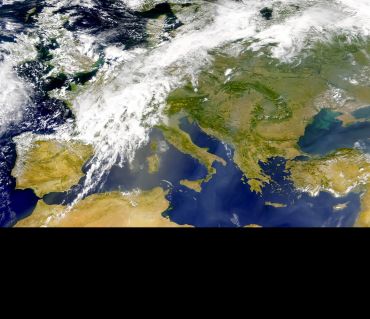Oxford climate research excellence recognised by renewed Met Office partnership
Thursday 15th Dec 2022, 12.29pm
The University of Oxford has been selected to help deliver the Met Office Academic Partnership (MOAP) for a further three years, as part of a multi-institutional agreement supporting cutting-edge research in the science of weather and climate prediction.
The Met Office Academic Partnership gives the University the opportunity to enhance its contributions to weather and climate science. By working with the Met Office and other partners we aim to accelerate our research and to extend its impact and reach, including influencing global bodies such as the Intergovernmental Panel on Climate Change (IPCC) and providing advice to governments around the world to help shape their policies.
Professor Patrick Grant, Pro-Vice-Chancellor (Research)
This expanded agreement will significantly enhance Oxford’s research capabilities in climate physics, climate dynamics, earth observation and geophysical fluid dynamics, involving researchers across the physical, mathematical and social sciences. The contributions from University of Oxford researchers will cover several strategic areas, including fusing simulations with data sciences, high-resolution imaging, seamless environmental prediction, and capturing environmental complexity.
Oxford’s agreement will also specifically fund:
- A professorial post to lead collaborative research programmes involving the Met Office and other MOAP members, across the MOAP priority areas, and to coordinate this work with the wider activities of the Oxford Climate Research Network,
- Support for around two DPhil students per year, from the Natural Environment Research Council’s CASE studentship programme, which provides doctoral students with research training experience as part of research collaborations between academic and non-academic partner organisations,
- Summer research studentships for undergraduate interns to work with Oxford researchers and Met Office scientists on short-term collaborative projects.
 The University of Oxford is playing a leading role in developing improved methods for climate simulations and calculating the probability of extreme weather events. Image credit: Shutterstock.
The University of Oxford is playing a leading role in developing improved methods for climate simulations and calculating the probability of extreme weather events. Image credit: Shutterstock.
The renewed agreement will build on the University of Oxford’s longstanding partnership with the Met Office, which began in 2013. Over the past five years, Oxford academics and Met Office scientists have collaborated on 24 joint research projects and co-authored 169 peer reviewed publications. Highlights of this work include:
- The distributed computing network climateprediction.net, developed by the University of Oxford and considered to be the world’s largest climate modelling experiment. This platform engages thousands of volunteers around the world to run large-scale modelling studies with the aim of improving climate simulations for the next century, including predictions of temperature, rainfall and the probability of extreme weather events.
- The IMPALA and UMFULA projects led by Professor Richard Washington (School of Geography and the Environment). These aim to deliver a deliver a step-change in climate predictive capability for Africa, on 5- to 40-year timescales.
- The Quasi-Biennial Oscillation Intercomparison project, co-led by Dr Scott Osprey (Department of Physics, University of Oxford) and Dr Neal Butchart (Met Office), with the goal of improving understanding around a specific weather phenomenon (involving winds in the tropical stratosphere) that strongly impacts global weather on the Earth’s surface.
Professor Tim Woollings in the Department of Physics, who chairs the Oxford partnership with the Met Office, said: ‘We are delighted that our partnership with the Met Office is continuing and developing, and that the wider MOAP network is flourishing. We face many challenges in understanding how our climate is changing and how to both mitigate and adapt to these changes. Networks such as MOAP help to bring our national expertise together to most effectively meet these challenges. Joint projects provide academic breadth and insight to the Met Office and give Oxford scientists access to data, modelling, and expertise at the Met Office.’
Professor Stephen Belcher, the Met Office’s Chief Scientist, said: ‘Extreme weather events and climate change pose among the greatest risks facing humanity. Tackling them is an urgent and huge undertaking. The Met Office can’t do it alone – the Met Office Academic Partnership harnesses the best of UK research and will give us the best chance of coping with and adapting to future change.’
The other institutions currently in the MOAP are the Universities of Birmingham, Bristol, Edinburgh, Exeter, Leeds, Reading, and University College London, UCL.
You can learn more about the MOAP at Oxford here.

